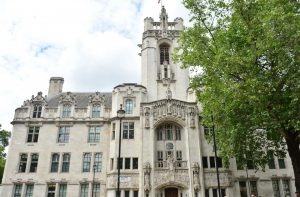Supreme Court of United Kingdom: In the instant appeal where the issue was whether the claimant can recover damages for the “consequences” (including the subsequent loss of liberty) of having committed the criminal offence during a serious psychotic episode, which she would not have committed but for the defendant’s negligence; the 7 Judge Bench of Lord Reed (President), Lord Hodge (Deputy President), Lady Black, Lord Lloyd-Jones, Lady Arden, Lord Kitchin and Lord Hamblen unanimously dismissed the appeal holding that the appellant’s claim for damages against Dorset Healthcare is barred by the appellant’s criminal act of manslaughter, and are therefore irrecoverable by reason of the doctrine of ex turpi causa non oritur actio (from a dishonorable cause an action does not arise) i.e. illegality.
Facts:
The appellant suffers from paranoid schizophrenia or schizoaffective disorder. On 25-08-2010 she stabbed her mother to death while experiencing a serious psychotic episode. She was charged with her mother’s murder but, in view of the psychiatric evidence, the prosecution agreed to a plea of manslaughter by reason of diminished responsibility. The appellant was sentenced to a hospital order under Section 37 of the Mental Health Act 1983 and an unlimited restriction order under Section 41 of the 1983 Act. The appellant has remained subject to detention pursuant to the 1983 Act ever since. Dorset Healthcare University NHS Foundation Trust (respondent) had admitted their negligence in failing to return the appellant to hospital on the basis of her obvious psychotic state. The tragic killing of her mother would not have occurred had this been done. On the basis of the respondent’s admission of negligence, the appellant furthered her claims to recover damages under several heads, such as- General damages for personal injury (a depressive disorder and post-traumatic stress disorder); damages for her loss of liberty caused by her compulsory detention in hospital; damages for loss of amenity arising from the consequences to her of having killed her mother; cost of caretaker and psychotherapy etc.
The relevant laws and case laws on point:
Before analyzing the merits of the instant appeal, the judges deliberated on the laws dealing with murder; insanity as a defence to murder; diminished responsibility as a partial defence to murder (Section 2 of the Homicide Act 1957); The Sentencing Council Guideline directing the sentencing judge to consider whether the offender’s degree of responsibility is high, medium or lower and the provisions of Mental Health Act, 1983 itself.
The Bench also referred to 2 major case laws dealing with similar issues- Gray v. Thames Trains Ltd, [2009] UKHL 33 and Patel v. Mirza, [2016] UKSC 42. In Gray, the House of Lords had held that Mr. Gray’s negligence claim was barred by the defence of illegality because the damages he sought resulted from: (i) the sentence imposed on him by the criminal court; and (ii) his own criminal act of manslaughter. In Patel, the UK SC had held that the proper approach to the illegality defence at common law was one based on a balancing of public policy considerations. In assessing whether the public interest would be harmed in that way, the Court should consider – the underlying purpose of the illegality in question, and whether that purpose would be enhanced by denying the claim; any other relevant public policy on which denying the claim may have an impact; and whether denying the claim would be a proportionate response to the illegality.
Observations:
While deliberating on the appeal, the Bench formulated 3 issues– whether Gray can be distinguished; if not, whether Gray should be departed from; and, can the appellant recover the damages under any of heads of loss she has claimed. The Bench observed that key consideration in Gray was that the claimant had been found to be criminally responsible for his conduct, not the degree of personal responsibility which that reflected. The Bench thereby rejected the appellant’s contention and held that, “Gray cannot be distinguished. It involved the same offence, the same sentence and the reasoning of the majority applies regardless of the degree of personal responsibility for the offending”.
Regarding the 2nd issue, the Court while affirming Gray as being “Patel compliant” and should be applied and followed in similar cases, held that the policy reasons which support denial of the appellant’s claim include the consistency and public confidence principles identified in Gray. It was further held that, “Principles also include: the public interest in the proper allocation of NHS resources; close connection between her claim and her offence; and the public interest in deterring, protecting the public from and condemning unlawful killing. Although a claimant in the appellant’s position may not be deterred from unlawful killing by being deprived of a civil right to compensation, there may well be a broader deterrent effect in a clear rule that unlawful killing never pays. Any such effect is important given the fundamental importance of the right to life”.
Finally addressing the 3rd issue, the Bench held that the appellant cannot claim damages for loss of liberty or for loss of amenity during her detention in hospital because these losses resulted from the sentence imposed on her by the criminal court. The other heads of loss cannot be recovered either because they result from the appellant’s unlawful killing of her mother.[Ecila Henderson v. Dorset Healthcare University NHS Foundation Trust, [2020] 3 WLR 1124, decided on 30-10-2020]
Sucheta Sarkar, Editorial Assistant has put this story together

